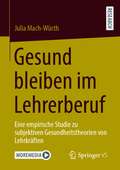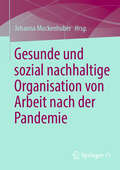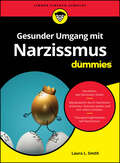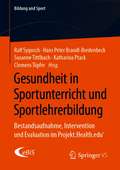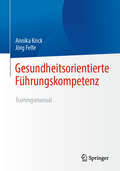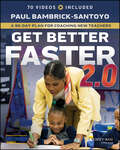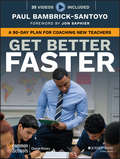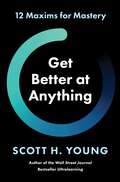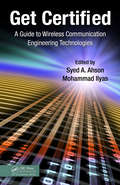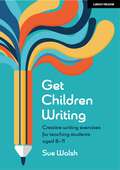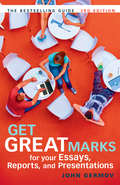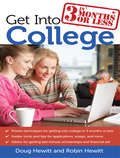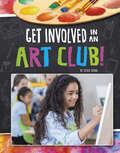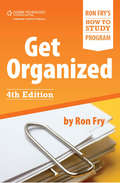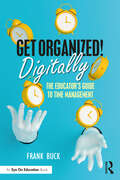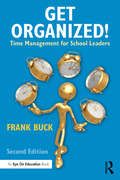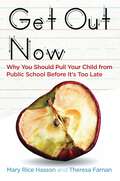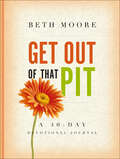- Table View
- List View
Gesund bleiben im Lehrerberuf: Eine empirische Studie zu subjektiven Gesundheitstheorien von Lehrkräften.
by Julia Mach-WürthEmpirische Studien zeigen, dass der Lehrerberuf psychisch stark belastend ist und dass Zusammenhänge zwischen dem Gesundheitszustand der Lehrkräfte und der Bildungsqualität der heranwachsenden Generation vorliegen. Auf diesen Erkenntnissen aufbauend beschäftigt sich die vorliegende Studie damit, welche subjektiven Theorien Lehrkräfte bezüglich des Erhalts ihrer Gesundheit im beruflichen Kontext explizieren und welche eigenen Handlungsmöglichkeiten sie dabei sehen. Die Ergebnisse werden im Kontext von Schul- und Personalentwicklung sowie Lehrerprofessionalität diskutiert und für Wissenschaft und Praxis anschlussfähig gemacht.
Gesunde und sozial nachhaltige Organisation von Arbeit nach der Pandemie
by Johanna MuckenhuberIn dem Band wird diskutiert, wie sich die Arbeitsorganisation im Verlauf der Covid-19-Pandemie verändert hat: Welche Aspekte hybrider und digitalisierter Arbeit längerfristig bestehen bleiben, wie sich diese auf die ArbeitnehmerInnen auswirken und wie diese nachhaltig im Sinne eines ganzheitlichen Gesundheitsbegriffs gestaltet werden können. Neben der konkreten Arbeitsorganisation werden dabei auch Aspekte sozialer Sicherheit im Spannungsfeld mit erhöhter Flexibilität in der Arbeitswelt analysiert.
Gesunder Umgang mit Narzissmus für Dummies (Für Dummies)
by Laura L. SmithGroßartig – leider oft auf Kosten anderer Narzissten erscheinen anfangs oft charmant, doch Partner, Freunde, Arbeitskollegen oder Familienmitglieder leiden oft unter diesen sehr speziellen Persönlichkeiten. Vermuten Sie, dass Sie selbst oder jemand in Ihrem Leben ein Narzisst ist, und möchten mehr darüber erfahren, wie Narzissten ticken? Laura L. Smith stellt typische Verhaltensweisen von Narzissten vor und erläutert die Warnzeichen, auf die Sie achten sollten. Sie bekommen Tipps, wie Sie sich vor narzisstischer Manipulation schützen können. Das Buch hilft Ihnen, sich aus narzisstischen Verstrickungen zu lösen, und erklärt die Möglichkeiten, wie Narzissmus behandelt werden kann. Sie erfahren Wie ein Mensch zum Narzissten wird Wie Sie im Umgang mit Narzissten Ihren eigenen Selbstwert bewahren können Wie Sie sich aus den Fängen von Narzissten befreien können Wie Psychotherapie bei Narzissmus hilft
Gesundheit in Sportunterricht und Sportlehrerbildung: Bestandsaufnahme, Intervention und Evaluation im Projekt ‚Health.edu‘ (Bildung und Sport #21)
by Ralf Sygusch Hans Peter Brandl-Bredenbeck Susanne Tittlbach Katharina Ptack Clemens TöpferDer Band bietet qualitative und quantitative Befunde zum Thema Gesundheit in Sportunterricht und Lehrerbildung im Fach Sport. Das Projekt ‚Health.edu‘ zielt auf eine nachhaltige Entwicklung der sportbezogenen Gesundheitskompetenz von Schülerinnen und Schülern. Dazu spannt das Projekt den Bogen vom Sportunterricht über die universitäre Sportlehrerbildung bis zum Vorbereitungsdienst. Im ersten Schritt wird eine Bestandsaufnahme zur Umsetzung des Themas Gesundheit in Sportunterricht und Sportlehrerbildung vorgenommen. Die anschließende Intervention folgt dem partizipativen Ansatz der Kooperativen Planung, in der alle beteiligten Stakeholder eines Settings involviert werden, um gemeinsam eine nachhaltige Implementation zu gewährleisten. Konzeption, Durchführung und Wirksamkeit der Intervention werden systematisch evaluiert.
Gesundheitsorientierte Führungskompetenz: Trainingsmanual
by Jörg Felfe Annika KrickDieses Trainingsmanual bietet alles, was Sie für das Führungskräftetraining zur Förderung gesundheitsorientierter Führungskompetenz benötigen. Als Grundlage und Ausgangspunkt dient das Health-oriented Leadership Konzept (HoL) mit dem Fokus auf gesundheitsorientierter Selbst- und Mitarbeiterführung (SelfCare und StaffCare). Das Training selbst ist modular aufgebaut und besteht aus den folgenden 5 Bausteinen:Baustein 1 „Warm up“Baustein 2 „Grundlagen”Baustein 3 “SelfCare”Baustein 4 “StaffCare” Baustein 5 “Cool down”Somit ist das Manual mit dem klaren Anwendungsbezug bestens geeignet, das Training in der Praxis direkt umzusetzen. Im Manual werden auch die Voraussetzungen und Bedingungen für die erfolgreiche Trainingsdurchführung thematisiert. Der theoretische Hintergrund des Trainings wird anschaulich dargestellt und die Konzeption des Trainings praxisnah erläutert. Zusätzlich gibt es für jedes Modul konkrete und detaillierte Traineranweisungen und das Material für die Durchführung des Trainings.
Get A Life (Clearwater Crossing, #1)
by Laura Peyton RobertsWhen a classmate is diagnosed with leukemia, the students at CCH organize a fund-raising carnival. But after they've formed teams to work the booths, the members of one group find they couldn't be more different. Soon, the carnival is over, and the surprisingly close-knit team members drift back to their regular lives. Then an unexpected tragedy strikes. Will the eight friends come together again? Or is it time to say good-bye?
Get Better Faster 2.0: A 90-Day Plan for Coaching New Teachers
by Paul Bambrick-SantoyoCoaching strategies and resources that will give new teachers a head start toward a successful first year—and a great teaching career Over the past 20 years, more new teachers than ever have entered the teaching profession. These educators are eager to do the best they can with the students they have and the resources they have been given, but most will struggle to find their footing. And with the average new teacher receiving only 1 or 2 observations a year, many early career teachers exit the profession without reaching their full potential. In Get Better Faster 2.0: A 90-Day Coaching for Coaching Teachers, Paul Bambrick-Santoyo shares a practical guide to new teacher development inspired by over two decades of working alongside highly effective school leaders. These instructional leaders are skilled at developing new educators, and Bambrick-Santoyo has organized their best practices into a comprehensive, actionable guide to coaching that keeps teacher growth—and student learning—top of mind. Get Better Faster 2.0 is divided into a 90-day plan and can be used to coach any teacher at any stage of their career. Teaching skills are broken down by priority into concrete, practice-able actions that principals and instructional coaches can layer as teachers reach mastery. The book contains a wealth of resources to streamline and empower a school leader's work. Here are just a few: Principles of Coaching: Learn from fellow principals how to do the following: use bite-sized feedback, facilitate in-meeting practice, and give frequent feedback to supercharge teacher development. Coaching Blueprints: Leverage existing tools to cultivate continuous teacher growth. Reshape your Professional Development plan, observations and feedback meetings, and weekly data meetings to build strong teachers. Get Better Faster Sequence of Action Steps: Pinpoint what is most important for teacher development with this sequential, four-phase guide to rigorous instruction and strong class culture. These tools, along with coaching videos, the Get Better Faster 2.0 Coaching Guide, insights from school leaders, and a suite of print-ready materials, prepare school leaders to take new and experienced teachers to the next level.
Get Better Faster: A 90-Day Plan for Coaching New Teachers
by Paul Bambrick-Santoyo Jon Saphier"Make sure your students follow your instructions." That sounds like a straightforward instruction, but in fact, it's fairly abstract. What does a teacher actually have to do to make sure students are following? Even the leader delivering this direction may not know, and the first-year teacher almost certainly doesn't. The vast majority of teachers are only observed one or two times per year on average--and even among those who are observed, scarcely any are given feedback as to how they could improve. The bottom line is clear: teachers do not need to be evaluated so much as they need to be developed and coached. In Get Better Faster: A 90-Day Plan for Coaching New Teachers, Paul Bambrick-Santoyo shares instructive tools of how school leaders can effectively guide new teachers to success. Over the course of the book, we break down the most critical actions leaders and teachers must enact to achieve exemplary results. Designed for coaches as well as beginning teachers, Get Better Faster is an integral coaching tool for any school leader eager to help their teachers succeed. It's the book's focus on the actionable--the practice-able--that drives effective coaching. By practicing the concrete actions and micro-skills listed here, teachers will markedly improve their ability to lead a class, producing a steady chain reaction of future teaching success. Though focused heavily on the first 90 days of teacher development, it's possible to implement this work at any time. New and old teachers alike can benefit from the guidance of Get Better Faster and close their existing instructional gaps. Packed with practical training tools, including agendas, presentation slides, a coach's guide, handouts, planning templates, and 35 video clips of real teachers at work, Get Better Faster will teach you: The core principles of coaching: Go Granular, Make Feedback More Frequent, Top action steps to launch a teacher's development in an easy-to-read scope and sequence guide The four phases of skill building: Phase 1 (Pre-Teaching): Dress Rehearsal Phase 2: Instant Immersion Phase 3: Getting into Gear Phase 4: The Power of Discourse
Get Better at Anything: 12 Maxims for Mastery
by Scott H. YoungThe author of the Wall Street Journal bestseller Ultralearning explores why it’s so difficult for people to learn new skills, arguing that three factors must be met to make advancement possible, and offering 12 maxims to improve the way we learn.Life revolves around learning—in school, at our jobs, even in the things we do for fun. Yet learning is often mysterious. Sometimes it comes fairly effortlessly: quickly finding our way around a new neighborhood or picking up the routine at a new job. In other cases, it’s a slog. We may spend hours in the library, yet still not do well on an exam. We may want to switch companies, industries, or even professions, but not feel qualified to make the leap. Decades spent driving a car, typing on a computer, or hitting a tennis ball don’t reliably make us much better at them. Improvement can be fickle, if it comes at all.In Get Better At Anything, Scott Young argues that there are three key factors in helping us learn:See—Most of what we know comes from other people. The ease of learning from others determines, to a large extent, how quickly we can improve.Do—Mastery requires practice. But not just any practice will do. Our brains are fantastic effort-saving machines, which can be both a tremendous advantage and a curse.Feedback—Progress requires constant adjustment. Not just the red stroke of a teacher’s pen, but the results of hands-on experience.When we’re able to learn from the example of other people, practice extensively ourselves, and get reliable feedback, rapid progress results. Yet, when one, or all, of these factors is inhibited, improvement often becomes impossible. Using research and real-life examples, Young breaks down these elements into twelve simple maxims. Whether you’re a student studying for an exam, an employee facing a new skill at work, or just want to get better at something you’re interested in, his insights will help you do it better.
Get Certified: A Guide to Wireless Communication Engineering Technologies
by Mohammad Ilyas Syed A. AhsonThe Institute of Electrical and Electronics Engineers (IEEE) Communications Society designed the IEEE wireless communication engineering technologies (WCET) certification program to address the wireless industry's growing need for communications professionals with practical problem-solving skills in real-world situations. Individuals who achieve th
Get Children Writing: Creative writing exercises for teaching students aged 8–11
by Sue WalshThis is a guide to teaching creative writing to primary school children aged 8-11.The 22 classroom-tested exercises encourage students to explore their emotions, their senses, and the world around them. Activities are designed to get children thinking about and describing what they see, hear, smell, taste and the thoughts which pass through their minds, re-enforcing their basic grammar and widening their vocabulary.The aim is to get children writing for enjoyment.The assignments are a springboard from which ideas are formed and then developed. They are structured to encourage spontaneous thought and to allow the writer to follow ideas; freeing the conscious mind from restraint to simply write. Above all, they are for children to have fun, to help them tap into emotions and imagination - which may well surprise both them and you.Get Children Writing brings together clear objectives, teachers' notes, and examples of techniques, styles, and formats drawn from classic children's literature into one classroom-ready sourcebook. Many of the assignments can be adapted to suit children younger or older than 8-11.We all love a story.
Get Children Writing: Creative writing exercises for teaching students aged 8–11
by Sue WalshThis is a guide to teaching creative writing to primary school children aged 8-11.The 22 classroom-tested exercises encourage students to explore their emotions, their senses, and the world around them. Activities are designed to get children thinking about and describing what they see, hear, smell, taste and the thoughts which pass through their minds, re-enforcing their basic grammar and widening their vocabulary.The aim is to get children writing for enjoyment.The assignments are a springboard from which ideas are formed and then developed. They are structured to encourage spontaneous thought and to allow the writer to follow ideas; freeing the conscious mind from restraint to simply write. Above all, they are for children to have fun, to help them tap into emotions and imagination - which may well surprise both them and you.Get Children Writing brings together clear objectives, teachers' notes, and examples of techniques, styles, and formats drawn from classic children's literature into one classroom-ready sourcebook. Many of the assignments can be adapted to suit children younger or older than 8-11.We all love a story.
Get Great Marks for Your Essays, Reports, and Presentations
by John GermovNot sure how to begin writing? Four assignments and only four weeks to go before the deadline? Then this book is for you.Find out the rules of the essay-writing game: how to muckrake for information, write drafts, handle references, and do analysis. Discover where you win and lose marks. Learn how to take the right short cuts and make the most of your time.Get Great Marks for Your Essays, Reports, and Presentations tells you all you need to know to write successful essays and reports, and create attention-grabbing presentations in the social sciences and humanities.This third edition is fully revised in response to readers' suggestions and includes extensive coverage of online resources, tips for getting the best from your computer tools, and guidance on how to pitch to your audience.'This guide is great. I had a lot of trouble passing my essays. After reading this book I found I wasn't alone. This book has helped me to understand how to improve my writing. It's easy to read and it's pretty cool too!' - Student comment
Get Into College
by Doug Hewitt Robin HewittEach year, thousands of parents find themselves in a frantic scramble to help their child get into college at the last minute. Cutting through the anxiety and frustration, Get Into College in 3 Months of Less offers the perfect last-minute rescue to ensuring college entrance. Filled with insider tips and tricks, this book is ideal for parents and their students who are too busy to spend hours combing through university brochures or filling in applications and need to complete the college admission process fast. By utilizing techniques practiced by college counselors across the nation, parents and students can find pertinent information on universities online, discover how to get financial aid quickly, create templates for filling out applications, and develop successful essays that can be used again and again! The authors also offer last-minute strategies for winning scholarships and grants. Get Into College in 3 Months or Less is sure to become an essential handbook for teenagers and their parents and counselors everywhere!
Get Involved in an Art Club! (Join the Club)
by Jessica Young Sylvie SparkAre you an art enthusiast? If so, an art club might be the right fit for you! Find out what it takes to join an art club or start your own, including information on membership, meetings, and activities. Together, you and your fellow members can participate, create, and most importantly, have fun. Take the plunge, join the club, and get involved!
Get Money for Your Classroom: Easy Grant Writing Ideas That Work
by Barbara GottschalkDo you have a great teaching idea but no way to pay for it? No problem! A successful grant proposal can be the answer. Get Money for Your Classroom guides you through each step of the grant-writing process, answering common questions and providing examples from real, successful grant proposals. The first half of the book breaks down the "nuts and bolts" of a grant application; the second half introduces the author’s MONEY TALKS acronym to illustrate ten important tips for writing a successful grant application: M: Make Time T: Tell a Story O: Obey the Application Rules A: Ask for Action Items N: Never Start New L: Learn What’s Funded E: Everybody Involved K: Keep Trying Y: Youth Input S: Show Sustainability Each chapter is full of examples—what to do and what to avoid—from the author’s own grant applications. The book’s appendix includes a list of national and regional grant programs appropriate for teachers. These helpful resources and the author’s practical advice will give you the confidence and motivation to start applying on your own!
Get Off Your Knees & Pray: A Woman's Guide to Life-Changing Prayer
by Sheila WalshHaving trouble talking to God? You’re not alone.We know we can talk to God, but it just sounds so important, so intimidating, so religious. We assume that only the very spiritual talk to him or hear from him directly. But author Sheila Walsh says, "Every sound we utter, every thank you we say, every tear we cry in God's presence is prayer."Get Off Your Knees and Pray is a real woman's guide to real prayer?from understanding the biblical basis for prayer to cultivating a vital personal relationship with God. It is the perfect blend of practical advice, personal stories, and biblical truth to encourage and help you achieve greater intimacy with God through prayer. Prayer is not just a few sentences we say while on our knees. It is living out our ongoing, every-moment commitment to God."Sheila steers us away from prayer as formula (say the right things the right way and God responds) and toward prayer as picture?a picture of God's desired relationship. Talking. Listening. Trusting. Living. This volume, warm and witty like its author, deserves a spot on every reading calendar." ?Max Lucado, best-selling author and minister"No matter what kind of difficulty you have about prayer, this book will help. Sheila has experienced all of them, and she will take you through them to where God has taken her: straight into His very real and accepting Presence." ?Dr. Henry Cloud, speaker and coauthor of Boundaries
Get Organized
by Ron FryGet Organized shows you how to create your ideal study environment by using simple time-management tips to develop to-do lists, daily schedules, monthly calendars, and project boards. Now updated to include electronic and online planning tools, this new edition also provides strategies that help you prioritize, avoid time trap activities, and anticipate opportunities. You'll learn how to make your study time efficient and effective.
Get Organized (Ron Fry's How to Study Program #2)
by Ron FryTake the stress out of studying with this students’ guide to time management and organization from the bestselling How to Study series. In this essential guide, education expert Ron Fry helps students of all ages develop organizational techniques, streamline study time, and avoid the stress of disorderly spaces and rushed schedules. Get Organized also provides strategies for prioritizing tasks, avoiding time-trap activities and procrastination, and anticipating opportunities. You’ll learn how to make your study time efficient and effective by using simple time-management tips that are practical, flexible, and adaptable for your personal goals. Get Organized features: Updated information on electronic and online planning toolsTips for creating ideal study environmentsProven techniques for establishing effective lifelong organizational habitsAdvice on making monthly and daily calendars work for youIdeas for creating optimal project boards and to-do listsPrepare. Prioritize. Plan. Whatever your age, you can benefit from the smart strategies in Get Organized.
Get Organized Digitally!: The Educator’s Guide to Time Management
by Frank BuckIn today’s world, we’re often overwhelmed by our digital devices and the volume of available digital information. Get Organized Digitally! outlines a complete digital organizational system for the busy educator and helps you harness the power of technology to save time. This book is your go-to source, presenting the "nuts and bolts" of exactly how to make technology work for you in both your personal and professional life. Special features of Get Organized Digitally!: Details of how to get started with the best digital organizational tools available today. Principles of digital organization that make all the components of your system work together. Stories that inspire and show how technology can make our lives easier. Time is the most precious resource we have; managing it well leads to greater productivity and less stress. Get Organized Digitally! shows educators how to harness the power of technology to spend time on what matters most—your school and your students.
Get Organized!: Time Management for School Leaders
by Frank BuckIn today’s world, we’re often overwhelmed by our digital devices, stacks of paper, and constant interruptions. Get Organized! outlines a complete organizational system for the busy school leader. Providing you with simple tools and techniques to bring order and control to your personal and professional life, this book will increase your productivity and decrease your stress. With Get Organized! you can spend your time on what matters most—your school and your students. Special Features: Includes easy to implement ideas, at little or no cost—you can start right away! Each chapter contains practical tips and tools, listing exactly what to do in order to implement the strategy. This entirely updated edition provides digital strategies and tips for thriving in the Information Age.
Get Organized: Second Edition
by Ron FryGet Organized can help you accomplish more in less time. The book presents simple time-management techniques that can make a big difference in your effectiveness. By deciding what is important and what isn't...by avoiding time traps...and by getting in the habit of developing to-do lists, daily schedules, monthly calendars, and project boards, readers learn how to make the most of their study time. They'll be studying smarter, not harder.
Get Out Now: Why You Should Pull Your Child from Public School Before It's Too Late
by Mary Rice Hasson Theresa FarnanShould we stay or should we go? Millions of parents with children in public schools can't believe they're asking this question. But they are. And you should be asking it too. Almost overnight, America's public schools have become morally toxic. And they are especially poisonous for the hearts and minds of children from religious families of every faith—ordinary families who value traditional morality and plain old common sense. Parents' first duty is to their children—to their intellect, their character, their souls. The facts on the ground point to one conclusion: get out now.
Get Out and Play (Step into Reading)
by John CenaJoin Elbow Grease, the little truck who never gives up, as he plays with his monster truck brothers in the rain and sun in this Step 1 Step Into Reading leveled reader from superstar entertainer and #1 New York Times bestselling author John Cena!A fun-filled leveled reader from multi-talented mega celebrity John Cena! Elbow Grease loves to race, splash and play with his four monster truck brothers: Tank, Flash, Pinball and Crash! The brothers enjoy a play day in this Step 1 reader based on John Cena's Elbow Grease picture book series!
Get Out of That Pit: A 40-day Devotional Journal
by Beth MooreFor everyone who has ever been in a pit-or is in one now-Beth Moore urges readers in her book Get Out of That Pit not to believe for one second that God has forgotten them. It was a truth she could pass to them from her years of pit-dwelling. What she learned in being delivered from that muck and darkness-shared in that very personal book-are lessons for us all about the healing to be found in Jesus.In this companion devotional journal, she continually points readers to the deliverance that awaits if they will lift their eyes, their voices, and their hands to the Power who can rescue them completely, as the psalmist did in Psalm 40. The scriptures, thought-provoking questions, prayers, and room for reflection within this lovely journal will assure fellow travelers that no matter how they got stuck, no matter how long they've been down, whether they think they deserve it or not, their Redeemer is waiting. And He has promised that they can begin this very day to Get Out of That Pit once and for all.
